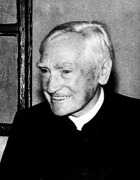Áron Márton
| Áron Márton | |
|---|---|
 | |
| Born |
August 28, 1896 Csíkszentdomokos |
| Died | September 29, 1980 |
Resting place | Roman Catholic Cathedral of Alba Iulia |
| Title | Roman Catholic Bishop |
| Predecessor | Adolf Vorbuchner |
| Successor | Antal Jakab |
Áron Márton (August 28, 1896 – September 29, 1980) was the bishop of the Roman Catholic Church in Transylvania during World War II and the communist dictatorship in Romania.
Early life
Áron Márton was born into a Székely Hungarian peasant family in the Transylvanian locality of Csíkszentdomokos (present-day Sândominic, Harghita County). After graduating from secondary school in 1915, he was drafted into the Austro-Hungarian Army. He was involved in battles of World War I in different military theatres, and was injured several times. After the war he worked as farmer, then was employed as metal worker at a factory in Braşov.
In 1920, Márton began his theology studies in Alba Iulia. Following this, he became a chaplain, and later theology professor in various Transylvanian localities. He was also court chaplain and archivist at the Alba-Iulia Bishopric after 1930, and priest of the University of Cluj. He was appointed the Bishop of Alba Iulia by Pope Pius XI in 1938.
Speaking up for the Jews
Márton was one of the first intellectuals to openly oppose the preparations for World War II, which he was already doing in 1938. He stayed in southern Transylvania, which remained part of Romania after the Second Vienna Award. In a speech he gave in St. Michael's Church, during a visit to Kolozsvár (Romanian: Cluj) in May 1944, he condemned the prepared deportation of Romanian and Hungarian Jews (see Holocaust in Hungary).
A couple of days later, he wrote letters to the Hungarian Government, to the Police and other authorities, requesting the prohibition of the deportation. As a response, Márton was expelled from the city. For his activities during this period, he was posthumously awarded the title "Righteous Among the Nations" by the Yad Vashem institute in Israel (in 1999).
Under the communist dictatorship
In 1945, after the death of Cardinal Jusztinián Serédi, Pope Pius XII wanted Márton to become the next Cardinal in Hungary, but, as the Hungarian Communist Party strongly opposed him, József Mindszenty was chosen for the position.
Áron Márton stayed in his homeland Transylvania and continued to be a strong advocate for religious freedom and human rights. This made him a prominent enemy of the Romanian Communist Party and of the dictatorial regime it established in late 1947. The Bishop was arrested in June 1948 and was sentenced to life imprisonment; five years later, with the change of the political climate in Romania, the circumstances of his captivity became more bearable. He was moved into a villa in the outskirts of Bucharest, he was also given back his prayer book, but was not allowed to contact the outside world. He was ultimately released in 1955.
Márton subsequently decided to revisit his bishopric, being received by an enthusiastic crowd. This proved embarrassing for the authorities, and he was subsequently confined to house arrest. Áron Márton was not allowed to leave the bishopric building for the following 11 years, and only emerged in 1967. He was finally released as a result of negotiations conducted by the Austrian Cardinal König in Bucharest. Over the following years, as he was still cautious of possible harassment from the authorities, Márton was accompanied by groups of Székely volunteers on his pastoral trips.
External links
- (Hungarian) Áron Márton web site
- (Hungarian) Statue of Áron Márton
| |||||||||||
|